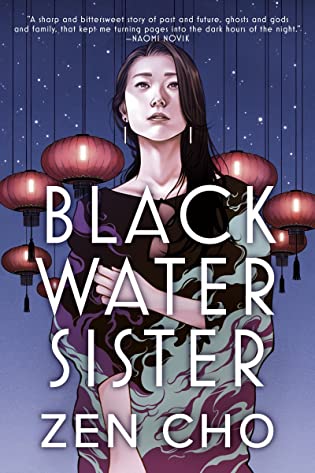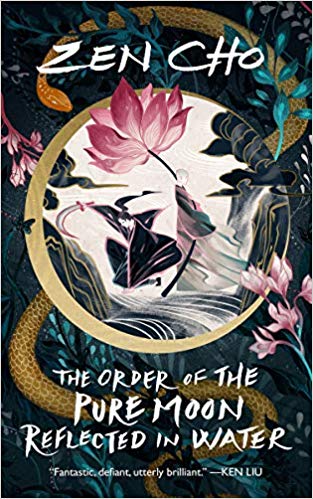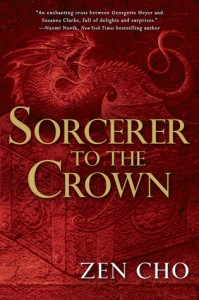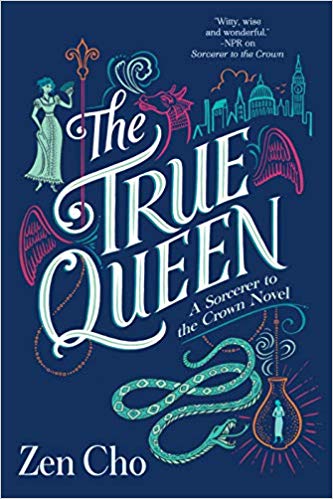 Black Water Sister by Zen Cho
Black Water Sister by Zen Cho Format: eARC
Source: supplied by publisher via Edelweiss
Formats available: hardcover, paperback, ebook, audiobook
Genres: magical realism, paranormal, urban fantasy
Pages: 370
Published by Ace Books on May 11, 2021
Purchasing Info: Author's Website, Publisher's Website, Amazon, Barnes & Noble, Kobo, Bookshop.org
Goodreads
A reluctant medium discovers the ties that bind can unleash a dangerous power in this compelling Malaysian-set contemporary fantasy.
Jessamyn Teoh is closeted, broke and moving back to Malaysia, a country she left when she was a toddler. So when Jess starts hearing voices, she chalks it up to stress. But there's only one voice in her head, and it claims to be the ghost of her estranged grandmother, Ah Ma. In life Ah Ma was a spirit medium, the avatar of a mysterious deity called the Black Water Sister. Now she's determined to settle a score against a gang boss who has offended the god--and she's decided Jess is going to help her do it.
Drawn into a world of gods, ghosts, and family secrets, Jess finds that making deals with capricious spirits is a dangerous business. As Jess fights for retribution for Ah Ma, she'll also need to regain control of her body and destiny. If she fails, the Black Water Sister may finish her off for good.
My Review:
It may be true that happy families are all alike while every unhappy family is unhappy in its own way, but it’s also true that, at least in fiction, all intrusive families are somewhat alike.
But Jess’ family isn’t quite like all the other intrusive families. Not that it isn’t very like them in a number of ways, but there’s one aspect that is definitely unique to them. Or one intrusion that’s unique to them, anyway.
Jess starts hearing voices. Well, specifically one voice, that of her recently deceased grandmother Ah Ma. Now that Jess and her family have moved back to Penang, her late grandmother has decided that Jess is the member of the family who can help her handle her unfinished business in this world so that she can move on to the next.
Ah Ma is living inside Jess’ head, sometimes taking over Jess’ body, and generally poking her ghostly nose into all of Jess’ business in order to make sure that Jess finishes up all of hers.
And that’s where the family secrets start, let’s call it manifesting, all over Penang and all over Jess’ currently drifting life.
Ah Ma needs to pull off one last score against a gangster – who she declares is not merely her biggest enemy but also the enemy of the god that Ah Ma was a medium for during her life. A duty she plans to pass on to Jess, whether Jess wants it or not.
But as Jess does her best to hold firm against the more extreme parts of her grandmother’s agenda – such as Ah Ma’s attempt to murder the gangster’s son using Jess’ hands as the weapon. Ah Ma knows that she herself is out of reach of Earthly justice, but her assertions that her god will protect Jess from the same don’t have nearly the same reassuring effect on Jess.
Along the way, Jess learns more than she bargained for about the real reason behind her family’s move from Malaysia to the U.S. And she comes to understand just what her mother has been trying to protect her from all these years.
And that none of it is exactly what any of them thought.
Escape Rating B: This is very much one of those mixed feelings reviews. On the one hand, there is SO MUCH to love about this story. And on the other hand, there are the trigger warnings. Some people will be disturbed by the abuse and the violence that her grandmother suffered as a young woman, and that Ah Ma enters the service of the god in order to get her revenge. A revenge that Black Water Sister is willing to grant her because she suffered the same thing in her life. Which also says important things about the utter, horrific pervasiveness of violence against women throughout history.
While those experiences were both terrible, but unfortunately all too historically plausible. The way that they are revealed to Jess, as dreams and nightmares sent by both vengeful female spirits, is also manipulative and abusive in its own way.
I also have to say that the extreme intrusiveness of Jess’ family, and what she feels as her lifelong servitude to her parents, are triggers for me, to the point where the constant overshadowing of Jess’ entire life by her family almost forces her to live in constant self-repression in order to not upset anyone about anything, is difficult for me to read.
From a certain perspective, her Ah Ma’s manipulations to force Jess into the same servitude to Black Water Sister that Ah Ma chose willingly is just a continuation of Jess’ extreme self-effacement. Almost to the point of self-erasure. That Jess has kept as much of her true self hidden as she has, and that she still demonstrably loves her family very much, makes her a compelling character who is just hard for me to read.
The author does a fantastic job of exploring and capturing the beauty of not just the place where the story is set, but also its culture and its history is marvelous. Using Jess as the outsider/insider who is remembering and rediscovering her heritage and her family’s history lets the reader immerse themselves along with her.
A part of me wants to call Black Water Sister a magical realism type of fantasy. There is magic in the world that in this particular story uses humans as its avatars to let it act on the world. Jess, when either Ah Ma or Black Water Sister is using her body to wreck their own revenge, is able to see all the gods and spirits that inhabit this place that feels familiar and yet isn’t quite the place her heart calls home.
Another perspective would be that it’s really humans doing everything all along, and yet, from Jess’ god-enhanced perspective, it’s clear that there is way more under the surface than is dreamt of in any Westernized philosophy. And that’s it’s all real, and that it all seems to want revenge.
This also reminds me more than a bit of Nothing But Blackened Teeth, not in that book’s horror aspects but in the way that the queer outsider is the person who is able to see the ghosts and spirits who move so much of the action and so many of the humans. There’s also a bit of, oddly enough, Dragon Age: Origins in the way that Ah Ma has given herself to Black Water Sister as an agent of their mutual revenge in much the same way that Flemeth merges with the goddess Mythal. And that the need for women to find supernatural assistance to avenge themselves on the men who have abused them feels universal.
In the end, the secrets that have been hidden and the revenge that is sought are all for very human reasons. But sometimes, even gods, especially gods that used to be humans, need a very human thing called closure.

 The Order of the Pure Moon Reflected in Water by
The Order of the Pure Moon Reflected in Water by  This was absolutely none of the things I was expecting when I picked it up – and that’s mostly a good thing. Although, at least so far, this author’s works have not quite, at least for this reader, lived up to her incredible debut,
This was absolutely none of the things I was expecting when I picked it up – and that’s mostly a good thing. Although, at least so far, this author’s works have not quite, at least for this reader, lived up to her incredible debut,  The True Queen (Sorcerer Royal #2) by
The True Queen (Sorcerer Royal #2) by